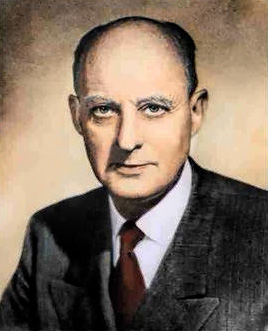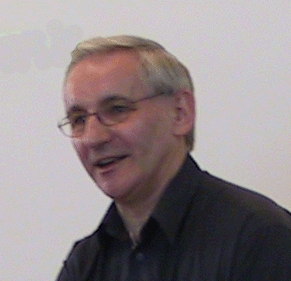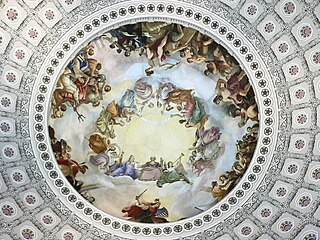Related Research Articles

Jürgen Habermas is a German philosopher and social theorist in the tradition of critical theory and pragmatism. His work addresses communicative rationality and the public sphere.
Secularism is the principle of seeking to conduct human affairs based on naturalistic considerations, uninvolved with religion.
In political science, a culture war is a type of cultural conflict between different social groups who struggle to politically impose their own ideology upon their society. In political usage, the term culture war is a metaphor for "hot-button" politics about values and ideologies, realized with intentionally adversarial social narratives meant to provoke political polarization among the mainstream of society over economic matters of public policy and of consumption. As practical politics, a culture war is about social policy wedge issues that are based on abstract arguments about values, morality, and lifestyle meant to provoke political cleavage in a multicultural society.

A new religious movement (NRM), also known as alternative spirituality or a new religion, is a religious or spiritual group that has modern origins and is peripheral to its society's dominant religious culture. NRMs can be novel in origin or they can be part of a wider religion, in which case they are distinct from pre-existing denominations. Some NRMs deal with the challenges that the modernizing world poses to them by embracing individualism, while other NRMs deal with them by embracing tightly knit collective means. Scholars have estimated that NRMs number in the tens of thousands worldwide. Most NRMs only have a few members, some of them have thousands of members, and a few of them have more than a million members.

Karl Paul Reinhold Niebuhr (1892–1971) was an American Reformed theologian, ethicist, commentator on politics and public affairs, and professor at Union Theological Seminary for more than 30 years. Niebuhr was one of America's leading public intellectuals for several decades of the 20th century and received the Presidential Medal of Freedom in 1964. A public theologian, he wrote and spoke frequently about the intersection of religion, politics, and public policy, with his most influential books including Moral Man and Immoral Society and The Nature and Destiny of Man.
Nondenominational Christianity consists of churches, and individual Christians, which typically distance themselves from the confessionalism or creedalism of other Christian communities by not formally aligning with a specific Christian denomination. According to Arizona Christian University's Cultural Research Center, nondenominational faith leaders typically maintain a biblical worldview at higher percentages than those of other Christian groups.

Peter Ludwig Berger was an Austrian-born American sociologist and Protestant theologian. Berger became known for his work in the sociology of knowledge, the sociology of religion, study of modernization, and theoretical contributions to sociological theory.

George Weigel is an American Catholic neoconservative author, political analyst, and social activist. He currently serves as a Distinguished Senior Fellow of the Ethics and Public Policy Center. Weigel was the Founding President of the James Madison Foundation. He is the author of a best-selling biography of Pope John Paul II, Witness to Hope, and Tranquillitas Ordinis: The Present Failure and Future Promise of American Catholic Thought on War and Peace.
William Eugene Connolly is an American political theorist known for his work on democracy, pluralism, capitalism and climate change. He is the Krieger-Eisenhower Professor of Political Science at Johns Hopkins University. His 1974 work The Terms of Political Discourse won the 1999 Benjamin Lippincott Award.

Irving R. Hexham is an English-Canadian academic who has published twenty-three books and numerous articles, chapters, and book reviews. Currently, he is Professor of Religious Studies at the University of Calgary, Alberta, Canada, married to Karla Poewe who is Professor Emeritus of Anthropology at the University of Calgary, and the father of two children. He holds dual British and Canadian citizenship.
Ronald M. Enroth was an American professor of sociology at Westmont College in Santa Barbara, California, and an evangelical Christian author of books concerning what he defined as "cults" and "new religious movements" and important figure in the Christian countercult movement.

American civil religion is a sociological theory that a nonsectarian religious faith exists within the United States with sacred symbols drawn from national history. Scholars have portrayed it as a common set of values that foster social and cultural integration. The ritualistic elements of ceremonial deism found in American ceremonies and presidential invocations of God can be seen as expressions of the American civil religion.
Christian Stephen Smith is an American sociologist, currently the William R. Kenan Jr. Professor of Sociology at the University of Notre Dame. Smith's research focuses primarily on religion in modernity, adolescents and emerging adults, sociological theory, philosophy of science, the science of generosity, American evangelicalism, and culture. Smith is well known for his contributions to the sociology of religion, particularly his research into adolescent spirituality, as well as for his contributions to sociological theory and his advocacy of critical realism.
Rodney William Stark was an American sociologist of religion who was a longtime professor of sociology and of comparative religion at the University of Washington. At the time of his death he was the Distinguished Professor of the Social Sciences at Baylor University, co-director of the university's Institute for Studies of Religion, and founding editor of the Interdisciplinary Journal of Research on Religion.
Social conservatism in the United States is a political ideology focused on the preservation of traditional values and beliefs. It focuses on a concern with moral and social values which proponents of the ideology see as degraded in modern society by liberalism. In the United States, one of the largest forces of social conservatism is the Christian right.
Carl A. Raschke is an American philosopher and theologian. Raschke is a Past Chair and Professor of Religious Studies Department at the University of Denver, specializing in continental philosophy, the philosophy of religion and the theory of religion. He was given the university lecturer award for 2020-2021. He is also listed with the affiliated faculty of the Global Center for Advanced Studies.
Joel Robbins is an American socio-cultural anthropologist; he is at the University of Cambridge, where he is the Sigrid Rausing Professor of Social Anthropology and the Deputy Head of Division and REF Coordinator for Division of Social Anthropology, as well as a Fellow at Trinity College. He was previously employed at the University of California, San Diego (1998–2013), and at Reed College (1996–1998), and was awarded his Ph.D. from the University of Virginia in 1998. He has published works on the anthropology of Papua New Guinea, anthropological theory, the anthropology of Christianity, religious change, the anthropology of ethics and morals, and the anthropology of value. Ethnographically, he is known for his work with the Urapmin people. His book Becoming Sinners: Christianity and Moral Torment in a Papua New Guinea Society was awarded the J. I. Staley prize by the School for Advanced Research in 2011. He is currently the series editor for the University of California Press "Anthropology of Christianity" book series, and has also served as a co-editor for the journal Anthropological Theory.
James S. Bielo is an American socio-cultural anthropologist, specializing in the Anthropology of Religion, the Anthropology of Christianity, American Religion, Urban Anthropology, Linguistic Anthropology, and the study of Material Religion. He is an associate professor of Religious Studies at Northwestern University. He was awarded his Ph.D. in anthropology in 2007 from Michigan State University. With Carrie M. Lane, he is the series founder and co-editor of the “Anthropology of Contemporary North America" book series at the University of Nebraska Press. He is one of the founders of the AnthroCyBib, an online bibliographic resource for the anthropology of Christianity that is hosted by the University of Edinburgh. He is also a founder and co-curator of Materializing the Bible, an interactive, curated a catalogue of biblical themed environments that covers "Protestant, Catholic and, to a lesser extent Jewish and Latter-Day Saints sites, that in different ways transforms the Bible into physical, interactive and choreographed environments, for purposes of immersion, personal piety, religious education and conversion."

Mathew Guest is a British sociologist and professor of sociology of religion at Durham University. Guest is the author or editor of numerous academic books, reports, journal articles and essays. His publications cover various topics in the sociology of religion, particularly evangelical Christianity in the UK, value transmission within clergy families, and the status of Christianity and Islam within university contexts.
Neo-Anabaptism is a Christian theological movement in the late twentieth and early twenty-first century inspired by classical Anabaptism. According to Stuart Murray, neo-Anabaptists "identify with the Anabaptist tradition and are happy to be known as Anabaptists, but have no historic or cultural links with any Anabaptist-related denomination".
References
- ↑ "Institute for Advanced Studies in Culture".
- ↑ "Interview: James Davison Hunter". 14 May 2010.
- ↑ "James davison hunter - evangelicalism". Archived from the original on 2012-06-26. Retrieved 2012-06-10.
- ↑ "Expecting to Change the World: A Reply to James Davison Hunter". 23 July 2010.
- ↑ "Archived copy" (PDF). Archived from the original (PDF) on 2012-10-20. Retrieved 2012-06-10.
{{cite web}}: CS1 maint: archived copy as title (link) - ↑ "James Davison Hunter - Bio". Archived from the original on 2012-06-20. Retrieved 2012-06-10.
- ↑ "Archived copy" (PDF). Archived from the original (PDF) on 2011-08-18. Retrieved 2012-06-10.
{{cite web}}: CS1 maint: archived copy as title (link) - ↑ Tye Rabens. "Faith Wars: Religion and Politics in America". State Press Magazine , 11/10/2010.
- ↑ Hunter, James Davison (29 April 2010). To Change the World - The irony, tragedy and possibility of Christianity in the late modern world. Oxford University Press. ISBN 978-0199730803.
- ↑ "Science and the Good".
- 1 2 3 Department of Sociology virginia.edu [ dead link ]
- ↑ Before the Shooting Begins. Free Press. 28 March 1994.
- ↑ "Review of "Democracy and Solidarity" by James Davison Hunter". City Journal. Retrieved 2024-05-15.